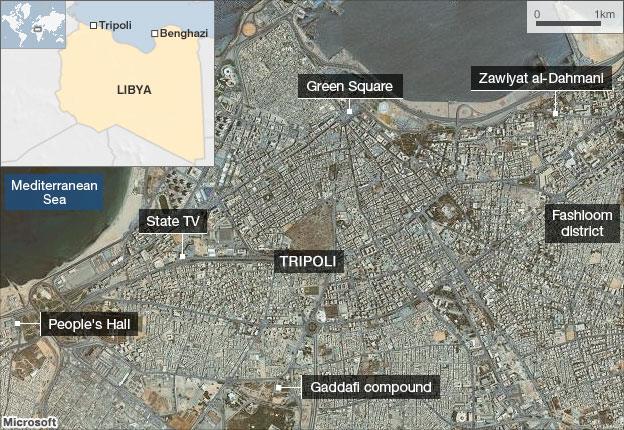Libya protests: Tripoli hit by renewed clashes
- Published
The BBC's Ian Pannell looks at the latest video purportedly showing Libyan protests
Security forces and protesters have clashed in Libya's capital, Tripoli, for a second night, after the government announced a new crackdown.
Witnesses say warplanes have fired on protesters in the city.
To the west of Tripoli, sources say the army is fighting forces loyal to ruler Col Muammar Gaddafi, who appears to be struggling to hold on to power.
Libya's deputy envoy to the UN has called on Col Gaddafi to step down, and accused his government of genocide.
Ibrahim Dabbashi said that if Col Gaddafi did not relinquish power, "the Libyan people will get rid of him".
US Secretary of State Hillary Clinton said the US joined the international community in "strongly condemning the violence in Libya".
"Now is the time to stop this unacceptable bloodshed," she added.
UN Secretary-General Ban Ki-moon was "outraged" at reports that the Libyan authorities had been firing at protesters from military aircraft, and warned that such action would constitute a serious violation of international humanitarian law, a spokesperson said.
"He once again calls for an immediate end to the violence."
Smoke and flames
The BBC's Jon Leyne, in neighbouring Egypt, says Col Gaddafi has now lost the support of almost every section of Libyan society.
Reports from several cities across Tripoli suggested much of the country was slipping from Col Gaddafi's grip.
Foreign journalists work under tight restriction in Libya, and much of the information coming from the country is impossible to verify.
But the regime has accepted that eastern cities such as al-Bayda and Benghazi - traditional pockets of resistance to the government - are now under the control of the opposition.
The unrest had not touched Tripoli until Sunday, when hundreds of protesters flooded the streets, only to be suppressed by security forces.
On Monday, state TV reported a renewed operation had begun against opposition elements.
"Security forces have started to storm into the dens of terror and sabotage, spurred by the hatred of Libya," the Libyan TV channel reported.
Libya's most senior diplomat in the United States, Ali Aujali, has criticised Colonel Gaddafi's regime
An eyewitness in Tripoli told the BBC he could see people being shot down by aircraft.
Another eyewitness in the capital said the suburbs of Fashloom and Zawiyat al-Dahmani had been cordoned off by security forces.
Protesters were out on the streets, and flames and smoke could be seen rising from the areas, the witness said.
Fashloom is one of Tripoli's poorest areas, and a BBC correspondent in the city says there are fears that many people may have died in the clashes.
Witnesses estimated more than 50 people had been killed in Tripoli since Sunday.
Before the unrest spread to the capital, the US-based Human Rights Watch estimated 233 people had been killed, but other campaign groups said the figure was much higher.
Col Gaddafi's son, Saif al-Islam, later told state media that there had been bombing raids near Tripoli and Benghazi, but said they had targeted ammunition stores and no civilian areas were hit.
In an earlier TV address, Saif al-Islam warned that the protests could lead to civil war, and vowed that the regime would "fight to the last bullet".
Amid the turmoil on the streets, senior officials have begun to desert the regime.
Justice Minister Mustapha Abdul Jalil quit the government because of the "excessive use of violence", the privately owned Quryna newspaper reported.
Libya's envoy to the Arab League, Abdel Moneim al-Honi, announced he was "joining the revolution".
And several diplomatic missions reportedly said they were pledging allegiance to the people of Libya rather than the Gaddafi government.
US ambassador Ali Aujali said he could no longer represent a government that killed its own people.
UN Secretary General Ban Ki-moon said he had urged Col Gaddafi in a 40-minute phone call to halt the escalating violence.
EU foreign ministers released a statement condemning the "ongoing repression against demonstrators", and said they deplored the violence and death of civilians.
Some European ministers have voiced concern that there could be a wave of illegal immigration, after Libya threatened to break co-operation on controlling the flow of Tunisians to Italy.
Meanwhile, Maltese officials say two Libyan fighter jets have landed there after the pilots asked for asylum because they were ordered to bomb civilians.
The violence has helped to push up oil prices to their highest levels since the global financial crisis of 2008.
International firms including BP, one of the world's biggest oil companies, are preparing to pull their staff out of Libya.
Thousands of Europeans have already fled the country.
